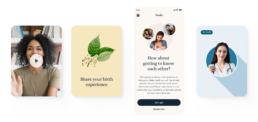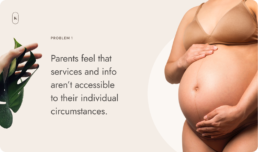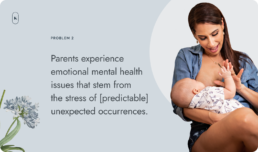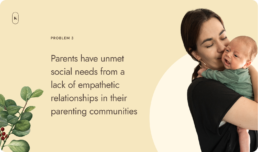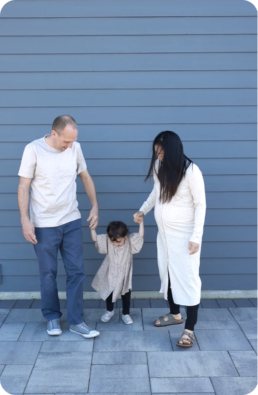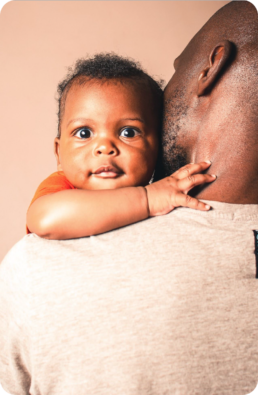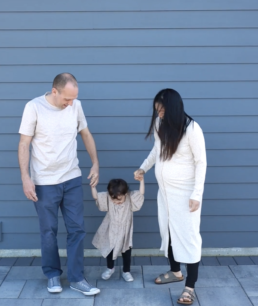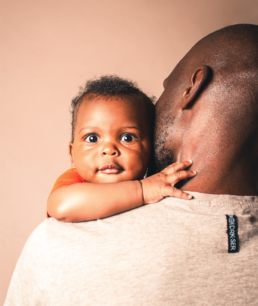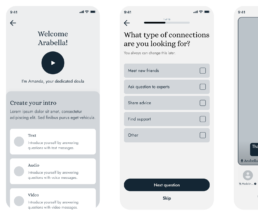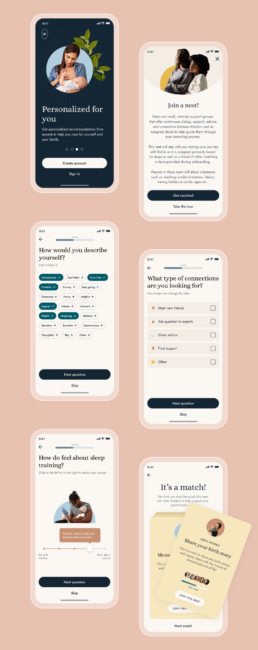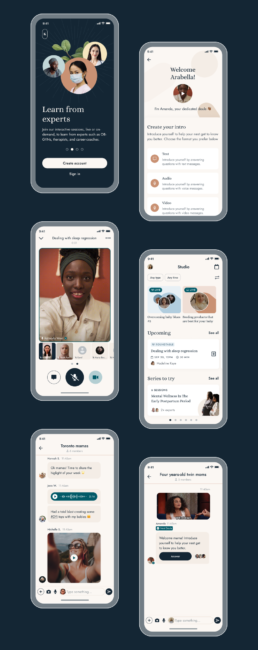Koble
How we built an expert-moderated and intimate community for parents to feel safe to learn and grow with Koble Cares, a Toronto-based startup that is shaking up the parenting and health tech industries with the launch of its digital platform.
Designing a community experience built for psychological safety
During eight weeks, my team and I here at MetaLab partnered with Koble, a Toronto-based startup that is shaking up the parenting and health tech industries with the launch of its digital platform. Koble’s purpose is to improve the health, happiness, and confidence of all parents by offering accessible and affordable support to families, globally. The healthcare system mainly focuses on the birthing experience, and additional services to support parents through postpartum and beyond are unaffordable for most. Growing a family is emotionally, physically, and financially demanding, and
the support available today is missing the mark, risking the health and well-being of millions of people yearly. With the rising number of new parents feeling lonely and the skyrocketing rates of postpartum depression due to the impact of the pandemic, the startup is seeing the need for a shift in consumer health solutions. Koble is paving the way for a new paradigm of parenting care — an aggregated health solution that supports their emotional, physical, and mental well-being through their parenting journey from the first trimester to the child’s first birthday.
First TimeParent Personas
Our target audience is first-time parents, repeat parents and support parents aged 25-40. They fall into two user archetypes. The proactive Researchers and the reactive Doers. We find both user archetypes in all services we propose because they are based on mindset—where they are starting from, how they feel about it, and what motivates them to improve.
Researchers
Researchers are early adopters of the app and have proactive roles. This archetype usually learns via research and is prepared for the unexpected. Naturally anxious, they are aware of their knowledge gaps.
Doers
Doers have reactive roles and learn via lived experiences. They are unprepared for the unexpected, naturally relaxed and unaware of their knowledge gaps.
First TimeParent Personas
Our target audience is first-time parents, repeat parents and support parents aged 25-40. They fall into two user archetypes. The proactive Researchers and the reactive Doers. We find both user archetypes in all services we propose because they are based on mindset—where they are starting from, how they feel about it, and what motivates them to improve.
Researchers
Researchers are early adopters of the app and have proactive roles. This archetype usually learns via research and is prepared for the unexpected. Naturally anxious, they are aware of their knowledge gaps.
Doers
Doers have reactive roles and learn via lived experiences. They are unprepared for the unexpected, naturally relaxed and unaware of their knowledge gaps.
Hack the design process
With an established acquisition funnel through onboarding, we needed to be mindful of Koble’s existing app architecture and design system to ensure that the experience we built would be consistent and integrate seamlessly into theirs. This encouraged us to avoid mismanaged expectations that could hurt the scope and investigate other solutions to current end-user pain points in the community experience. Thus we hacked our design process for quick iteration in a tight timeline. We opted for one Crazy 8’s per-flow for each feature for one week to overview the information. Keeping our
core persona at the forefront, we considered complexity, risk, effort, and other factors around each community feature during this stage. We defined different features’ stages and interactions to understand their mechanics, which gradually changed depending on users’ needs. Our focus area included only private cohort groups we call “Nests,” involving community-matching and chat and expert-led roundtables to help parents with support, communication, and learning. That way, we could create a lean-first version of a robust community layer.
Nest Cohort
Becoming a parent is a beautiful experience but comes with physical and emotional challenges. Parents can develop and strengthen relationships amongst their family members and peers by attending private support groups called Nests, improving social well-being and the overall health of themselves and their babies. To create personalized matches, users answer psychographic questions to complete their profiles and define common/opposite points with other users and groups based on personality, lifestyle, interests, parenting style, and social status.
Roundtables
Roundtables are a way for Koblers to connect with experts and each other and provide a space to share, support and educate in a structured and engaging setting. Joining a roundtable is a way to talk, learn, share, and get actionable advice on specific topics and connect with attendees after a session. When people feel psychologically safe, they’re more likely to share information, seek feedback, ask for help, and talk openly about mistakes. In contrast, a lack of psychological safety can make it hard for people to speak up and surface ideas or challenges. Some users are more susceptible than others to being targeted by harassers. Allowing users to block or restrict other people from seeing their content or interacting with them can help protect users from unwanted communication. Therefore, we allowed users to anonymously make their profile accounts partially private outside of their nests, post content, chat, and attend roundtables.
Roundtables
Roundtables are a way for Koblers to connect with experts and each other and provide a space to share, support and educate in a structured and engaging setting. Joining a roundtable is a way to talk, learn, share, and get actionable advice on specific topics and connect with attendees after a session. When people feel psychologically safe, they’re more likely to share information, seek feedback, ask for help, and talk openly about mistakes. In contrast, a lack of psychological safety can make it hard for people to speak up and surface ideas or challenges. Some users are more susceptible than others to being targeted by harassers. Allowing users to block or restrict other people from seeing their content or interacting with them can help protect users from unwanted communication. Therefore, we allowed users to anonymously make their profile accounts partially private outside of their nests, post content, chat, and attend roundtables.
Challenge our biggest hypothesis
We surveyed 22 parents to verify our biggest hypothesis around matching factors, group chat communication, and anonymity. We discovered that the top 3 commonalities for parents to connect with peers are personality (90.9%), lifestyle (86.4%), and parenting style, followed by openness to share (77.3%). These figures challenged our beliefs about parents’ social status (e.g., education level, employment status, religion, and marital status) as relevant for parental compatibility. When asked how parents typically prefer to communicate in group chats, 100% of respondents selected text chat. In comparison, video was selected second by 18.2% of respondents, and audio (e.g., audio chat, voice notes, audio call, etc.)
by 0%. During a roundtable, the decision by some participants to be anonymous can make others feel less comfortable sharing sensitive or private information. Some parents thought it should be an open space using your real identity or everyone should be anonymous. Having both options introduces vulnerability and a need for equilibrium. With WAU as our north star metric, early engagement and member feedback have instilled confidence in Koble’s value to families. The app was launched in October 2021 with 100 beta members of, 54% pre-birth, 46% post-birth, 68% first-time parents and 32% repeat-parents. Power Beta members are coming back to the platform 3x/week, consuming 2.5 sessions on average.
Principal Designer
Aurélie Radom
Product Designer
Fabiano Bernardo
Product Designer
PG Gonni
Design Director
Shiera Aryev
Client Partner
Emma Harris
Product Manager
Mélanie Arras
